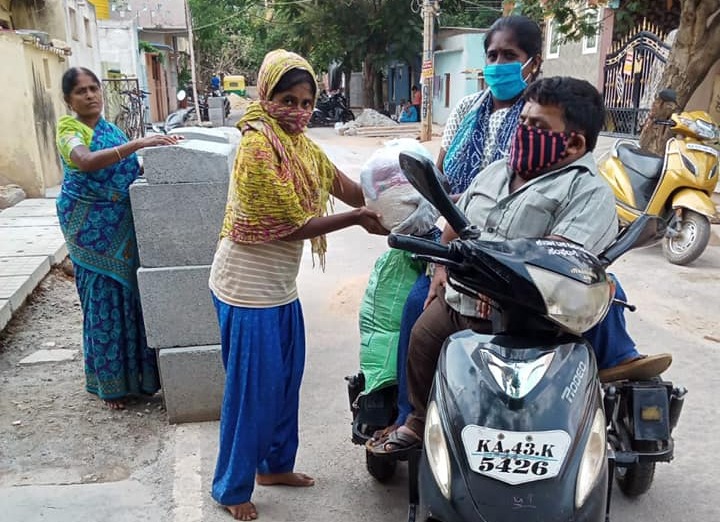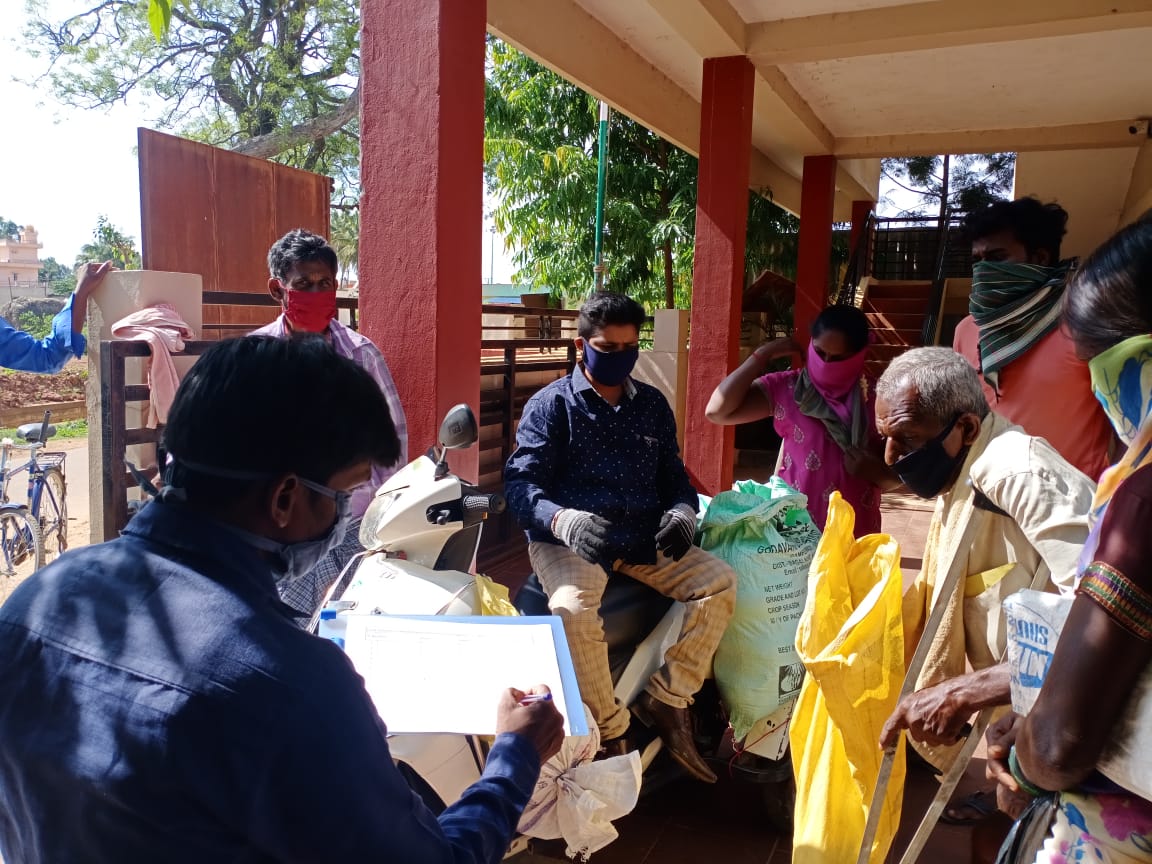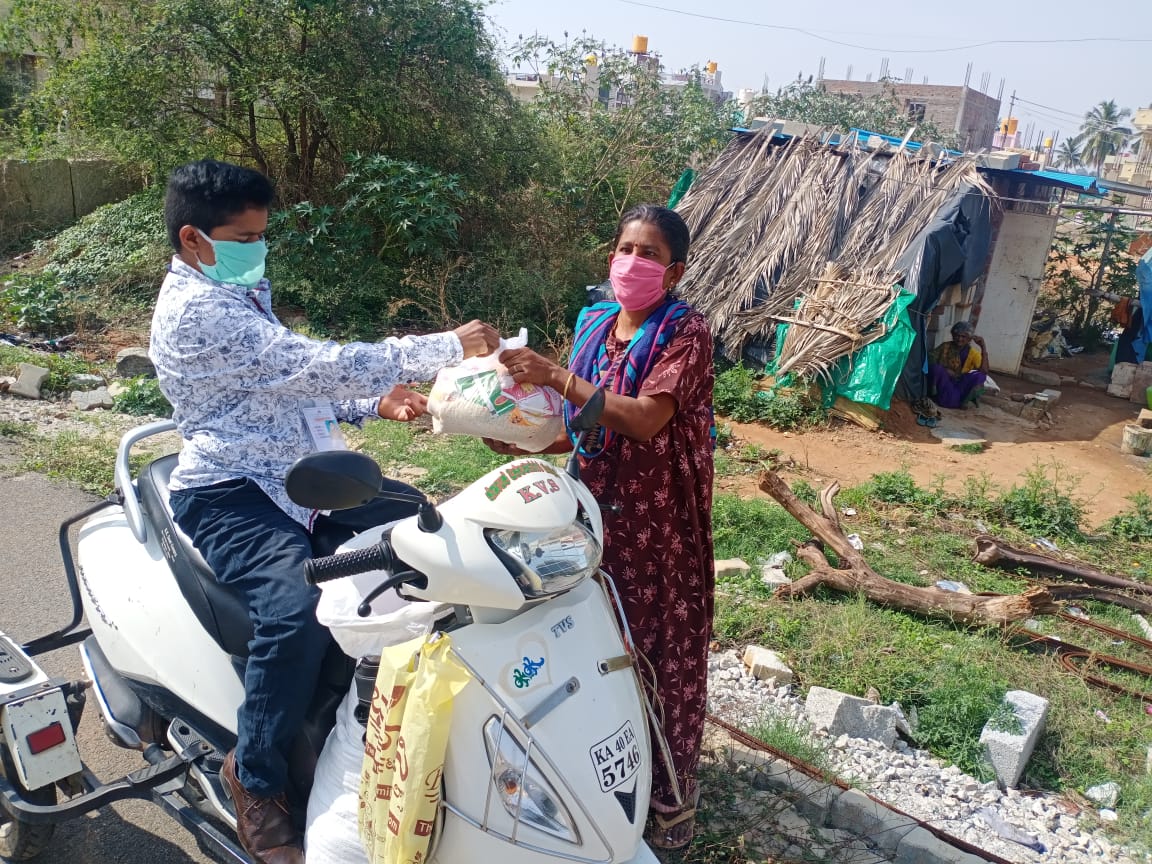
A heart of gold, iron grit: Marginalised turn saviours during lockdown
They are a marginalised population, but that has not stopped those with disabilities and sexual minorities from doing their bit for those who are in need during the lockdown to fight COVID-19.

They are a marginalised population, but that has not stopped those with disabilities and sexual minorities from doing their bit for those who are in need during the lockdown to fight COVID-19.
A polio attack that left him with a permanent disability in both legs has not deterred B Jayachandran from serving the needy during the lockdown. Based in Thiruvallur in Tamil Nadu, Jayachandran, secretary of the NGO Vasantham Federation, is currently undertaking a survey of pregnant women with disabilities, needing help and assistance.
He says, “I was initially unsure if I would be able to undertake awareness and distribution activities. People with disabilities have a weak immune system and are vulnerable to infections. However, I also thought I shouldn’t think of the consequences. I joined this organisation to serve people like me.”
A few days into the lockdown, Jayachandran began making rounds of the villages in the district to create awareness on the need to wear a mask and practise hand hygiene by washing soap and using sanitisers. He also distributed aid like ration kits and medicines for those in need.
However, he says he is not alone, since he claimed the NGO’s volunteers are predominantly people with disabilities. Among the 14,000-odd volunteers, only 74 are without disabilities.

Livingston A, founder of the Vasantham Federation, explains, “We have people with locomotor disabilities, visual impairment, and hearing impairment, apart from dwarfs, as volunteers with us. Thiruvallur is home to the second highest population of people with disabilities, the first being Chennai.”
He also adds that a good part of the disabled population in the district have been affected by the lockdown as they work as vendors on trains and buses. Some are also dependent on every day labour activities like the 100 days of work scheme under the Mahatma Gandhi National Rural Employment Guarantee Act (MNREGA). “We have reached to over 2,000 people during this time to help them sail through the lockdown period,” Livingston added.
In Karnataka’s Chikballapur, Karnataka Vikalchetanara Samasthe (KVS), an organization of socio-economically disadvantaged people with disabilities, has been offering similar services and contributions.
Most of the 8,600 KVS members and 250 volunteers include Dalits, adivasis and/or HIV+ women, sexual minorities (also called LGBTQIA+ persons) working as autorickshaw drivers, street vendors, agricultural labourers, and other jobs with low income and minimal assets.

In late March, Kiran Nayak B, an economically backward 34-year old Adivasi transman with an orthopaedic disability (who relocated to Chikballapur from Warangal district, Telangana with his spirited partner Kavya over 12 years ago), and one of the founders of the KVS, reached out to a group of workers from Raigad, Maharashtra.
The group of 164 people with 36 children were suffering as they had been ostracised after displaying symptoms of COVID-19 like cough and cold. Kiran quickly alerted the Gauribiddanur taluk and Chikballapur district administration officers about the workers. The district administration officers accommodated the Maharashtra workers in a government hostel in Chikballapur with 2 daily meals while KVS members gave them breakfast, other essentials and counseling regularly.
Another founder member Chandrashekhar R and his wife S Prabhavati have been leading by example. He adds, “My wife Prabhavati, a physically challenged Anganwadi teacher, and I bought our monthly quota of rice from the local PDS shop in March and April, but many extremely deprived persons got very little food or other essential items since the COVID-19 lockdown started.
“As our family includes only two small children and we could manage with less quantities of food grain, using our specially fitted two-wheeler, we transported most of our and Prabhavati’s Anganwadi’s ration stock, to around fifty people with disabilities in north Bangalore. Kiran’s friends promised to provide ration kits in one or two days for around 75 people with disabilities lacking support and livelihoods in north Bangalore,” he says.
Related news | People with disabilities in India left behind amid COVID-19 crisis
Aged 40 and a KVS governing board member, Chandrashekhar and 35-year old Prabhavati, who both studied till high school, live in Bengaluru, where Prabhavati is employed over the last 10 years. Chandrashekhar visits Chikballapur twice weekly for KVS activities and meetings apart from guiding poor people with disabilities in Bangalore in availing social entitlements.
Further, KVS members are educating relief recipients about COVID-19 prevention and care. “While the mandatory 14-day quarantine for travellers irrespective of their having COVID-19 or not, may help, a visible seal on their hands is very dehumanizing and humiliating. It promotes fear, ostracization and public and state surveillance. As a person living with HIV, I understand the pain of stigma. Incidentally, many HIV+ persons could not obtain their ART medication or undergo the recommended periodic testing when the lockdown started due to mobility restrictions, transport unavailability and COVID-19 susceptibility. If lucky, family members, friends or social workers supplied them ART medicines,” observed Sowbhagyamma, treasurer of KVS and a 42-year Dalit lady with a disability from Chintamani taluk who gave ration kits to around 25 families having people with disability and HIV.
As Chintamani was a red zone for over a month, Sowbhagyamma could reach only 30 more economically marginalized households having infirm elders and people with disabilities, with her 20-year old son Dinesh and she alternately driving her 3-wheeler loaded with ration kits.
Like Vasantham Federation, a Chennai-based NGO called Friends Disability Association has been reaching out to those in need through a group of volunteers who are disabled, to help their community members in Chennai.
Related news | Rape of disabled minor: Five get life imprisonment in Tamil Nadu
G Anandakumar, the founder of the group, says those who have retrofitted scooters have been entrusted with the task of distributing provisions. “We have been reaching out to those who are homeless and are providing them with the ration kits,” he says.
The group has been working closely with the corporation and has sought permission and e-passes to travel long distances to deliver the aid across the city. “The idea is to not just serve them during the lockdown but also seek help for them from government authorities so that they don’t have to depend on aid. We have also given a representation for the same to government officials.”
Like Vasantham, the 10-year-old organisation has been roping in volunteers from the self help groups of people with disabilities they have formed, running their own small business. A model that has helped them to achieve self reliance. They have also shown how NGOs can galvanise a whole community for a larger good.
Livingston says, “We work from the grassroots to the district level with teams at each level. We have also taken sessions on having similar models in other districts of TN, like Virudhunagar and Kancheepuram.”


